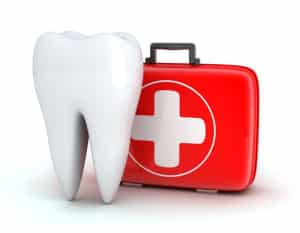 Dental emergencies should be dealt with as soon as possible – whether it’s by your dentist or another dentist who is equipped to handle such situations. However, many patients are unsure of what is considered an emergency versus a situation that could potentially wait. What constitutes a dental emergency? Generally speaking, most anything that threatens the stability of your tooth warrants a visit as soon as possible to your dentist. Usually, this includes a broken or chipped tooth, inflammation, and an abscessed tooth or gum tissue. The sooner you can get to your dentist, the less likely you are to lose your tooth.
Dental emergencies should be dealt with as soon as possible – whether it’s by your dentist or another dentist who is equipped to handle such situations. However, many patients are unsure of what is considered an emergency versus a situation that could potentially wait. What constitutes a dental emergency? Generally speaking, most anything that threatens the stability of your tooth warrants a visit as soon as possible to your dentist. Usually, this includes a broken or chipped tooth, inflammation, and an abscessed tooth or gum tissue. The sooner you can get to your dentist, the less likely you are to lose your tooth.
Broken Or Chipped Teeth
Teeth can be broken or chipped by a number of different ways, including facial injury. Bruxism, or teeth grinding, can also cause your teeth to break or chip, although it usually only occurs in severe cases.
Inflammation
Sometimes, the pulp of the tooth because inflamed – known as acute pulpitis – causing severe tooth pain and sensitivity.
Abscessed Tooth Or Gum Tissue
If an infection is left untreated, often times it will turn into an abscess. This causes pain, swelling, and sometimes, a fever. In order to keep your condition from worsening, this is considered a dental emergency because it should be dealt with right away.
What If I Lose My Tooth?
If your dentist recommends that your tooth be extracted to protect the rest of your mouth, or if your tooth falls out on its own – don’t worry! Discussing your restorative options with your dentist will be your next step, but your smile will be back to “normal” in no time.
